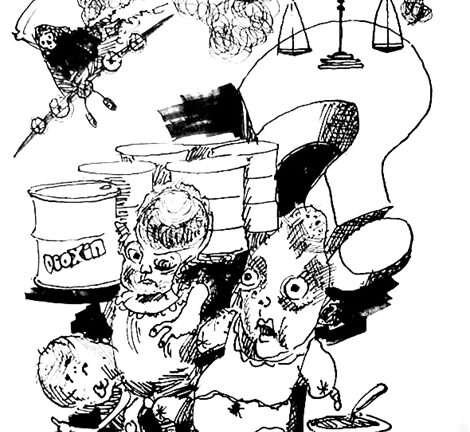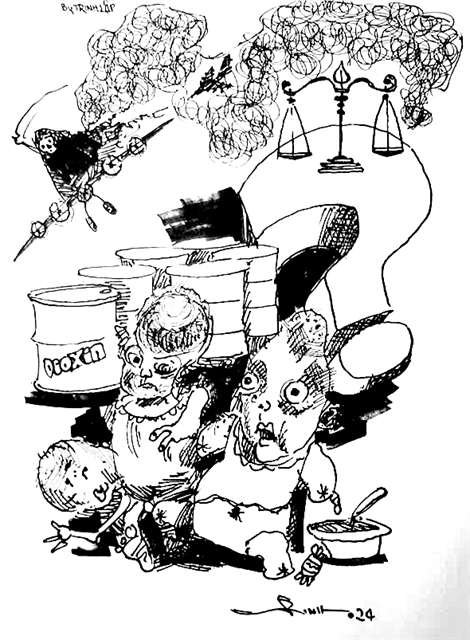The journey to justice for the victims of Agent Orange in Vietnam has been long, arduous, and fraught with challenges. Decades after the end of the Vietnam War, the toxic legacy of Agent Orange continues to cast a shadow over the lives of countless Vietnamese people, as well as the environment and the nation’s future generations. The fight for recognition, compensation, and healing remains ongoing, reflecting the complexities of seeking justice in the face of historical injustices.
Agent Orange, a powerful herbicide and defoliant used by the U.S. military during the Vietnam War, was intended to strip the dense jungle of its cover and expose enemy forces. However, the chemical’s impact went far beyond its intended purpose. Containing dioxin, one of the most toxic substances known to science, Agent Orange has been linked to severe health issues, including cancer, birth defects, and a host of other chronic diseases. The repercussions have been felt by multiple generations, as the toxic effects have been passed down from those directly exposed to their children and grandchildren.
For years, Vietnamese victims of Agent Orange have sought justice, but the path has been anything but straightforward. Legal battles, both within Vietnam and internationally, have faced numerous obstacles. The complexity of proving direct causality between Agent Orange exposure and specific health conditions has been a significant challenge, compounded by the fact that much of the evidence was either lost or destroyed in the chaos of war.
Despite these hurdles, Vietnam has persisted in its quest for justice. The Vietnamese government, alongside various non-governmental organizations and advocacy groups, has worked tirelessly to bring global attention to the issue. The aim is not only to secure compensation for the victims but also to address the ongoing environmental damage caused by dioxin contamination in various hotspots across the country.
Efforts to hold those responsible accountable have seen mixed results. In the United States, numerous lawsuits have been filed by Vietnamese victims and their supporters, targeting the chemical companies that manufactured Agent Orange. However, these legal efforts have largely been unsuccessful, with U.S. courts dismissing many of the cases on technical grounds, such as the statute of limitations or the argument that the companies were acting under government orders during wartime.
Internationally, the fight for justice has also encountered significant challenges. Vietnam has appealed to the United Nations and other international bodies, seeking recognition of the damages caused by Agent Orange as a violation of human rights. While these efforts have helped raise awareness, tangible outcomes, such as compensation or large-scale environmental remediation, have been limited.
Domestically, Vietnam has made some strides in supporting the victims of Agent Orange. The government has established programs to provide medical care, rehabilitation services, and financial assistance to those affected. Additionally, efforts to clean up dioxin-contaminated sites are underway, with some areas, such as Da Nang, seeing significant progress. These initiatives, while commendable, are often hampered by limited resources and the sheer scale of the problem.
The legacy of Agent Orange is not only a humanitarian issue but also a matter of national sovereignty and dignity. For Vietnam, the continued struggle for justice is a reflection of the broader fight to reclaim agency over its own history and to ensure that the voices of its people are heard on the global stage. The demand for justice is as much about securing reparations as it is about acknowledging the suffering inflicted upon the Vietnamese people and ensuring that such a tragedy is never repeated.
As the fight for justice continues, the victims of Agent Orange and their advocates face an uphill battle. The passage of time has not diminished the urgency of their cause, but it has made the quest for accountability more difficult. The international community’s response has been slow and, in many cases, inadequate, reflecting the complex interplay of politics, history, and law that surrounds this issue.
Looking forward, the challenge for Vietnam is to maintain momentum in its pursuit of justice while also addressing the immediate needs of those affected. This requires a multifaceted approach that includes continued legal advocacy, diplomatic efforts, and on-the-ground support for victims. The involvement of the global community, particularly in providing resources for environmental cleanup and victim assistance, is crucial to ensuring that the long walk to justice eventually reaches its destination.
The story of Agent Orange is a stark reminder of the enduring impact of war and the difficulties of seeking justice in its aftermath. For the victims, the scars of the past are ever-present, and the fight for recognition and reparation is a daily reality. As Vietnam continues to navigate this complex journey, the hope is that justice, though delayed, will ultimately be achieved.








